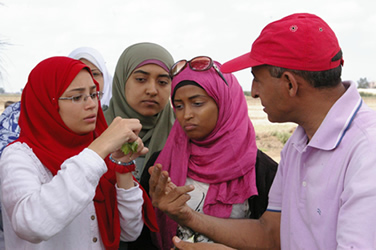
Visit to the Experimental Bt Cotton Field in Egypt
October 28, 2011| |
Biotechnology Information Center of Egypt (EBIC), in collaboration with Cotton Research Institute, Faculty of Agriculture at Cairo University, Plant Protection Institute, and Monsanto Egypt, organized a visit to Bt cotton field trials in Sakha Experimental Station at Kafr El-Shikh, Delta. The participants included representatives of the private sector, journalists, and students of the biotechnology program in Cairo University.
The insect resistant cotton under field trials are developed by experts from Cotton Research Institute in cooperation with Monsanto. Mr. Ahmed El Khishin, the representative of Monsanto in Egypt explained that the "project started in 2000 by cross breeding the Egyptian elite long staple cotton varieties with Bollgard II. Professor Adel El-Deep from the Cotton Research Institute, added that cross breeding selection has produced Egyptian cotton varieties that harbor Bt genes. To ensure the stability of the introduced genes, evaluation of the transgenic plants has been conducted over the last 10 years focusing on morphology, and the ability of the plants to resist cotton leaf worm and bollworms.
While addressing the various environmental and human health safety concerns raised by the participants, Professor Hassan Dahey from the Plant Protection Institute emphasized that the field trials were carried out under the guidelines of the Egyptian National Biosafety Committee. He assured the participants that no harmful effects of Bt cotton have been observed on beneficial insects or on human health during the testing period. On the contrary, the Bt cotton varieties had demonstrated 95-100% resistance to leaf worm infestations and almost 100% to the bollworms.
While highlighting the importance of the cotton industry in Egypt, Professor Adel El-Deep said that "Neither the area harvested with cotton in Egypt nor the cotton net production reflects the actual economic importance of the Egyptian cotton". Thus the need of employing all proven scientific innovations for crop improvement is of paramount importance.

For more details, contact Naglaa Abdalla of EBIC at naglaa_a@hotmail.com.
| |
Biotech Updates is a weekly newsletter of ISAAA, a not-for-profit organization. It is distributed for free to over 22,000 subscribers worldwide to inform them about the key developments in biosciences, especially in biotechnology. Your support will help us in our mission to feed the world with knowledge. You can help by donating as little as $10.
-
See more articles:
-
News from Around the World
- Nagoya Protocol Receives 65 Signatures
- Scientists Identify Stem Rust-resistant Wheat Landraces
- Visit to the Experimental Bt Cotton Field in Egypt
- Bill Gates Accepts Hunger Award
- New Agribiotech Company launched in the U.S. and Mexico
- Ethical Perception of Cross-species Gene Transfer
- New Genes for New Environments Project Launched in Australia
- UniMelb Scientists Developed Iron-fortified Rice
- Premanandh: Modern Technology, Political Will, and Sufficient Investments are Important for Food Sustainability
- China Accelerates GM Corn Research
- UNEP Report: Asia-Pacific Region Needs Sustainable Industrial System
- Proposed Criteria for Regulatory Decision-making on GM Crops
- Experts Discover Molecular Mechanisms Involved in Flood Tolerance
- UK Scientists Come Together to Help Feed the 7 Billion
-
Research Highlights
- Identification of Genes Involved in Natural Product Biosynthesis in Pomegranate
- No Adverse Effect of GM Wheat on Soil Fauna Community
- Scientists Identify QTL Involved in Grain Weight of Rice
-
Beyond Crop Biotech
- Living Mega-cells Found in Mariana Trench
- Parasite's Genome Reveals Clues for Treatment of Ascariasis
- Scientists Sequence Human Liver Fluke Genome
-
Announcements
- BioMalaysia 2011
-
Read the latest: - Biotech Updates (January 28, 2026)
- Gene Editing Supplement (January 28, 2026)
- Gene Drive Supplement (February 22, 2023)
-
Subscribe to BU: - Share
- Tweet
